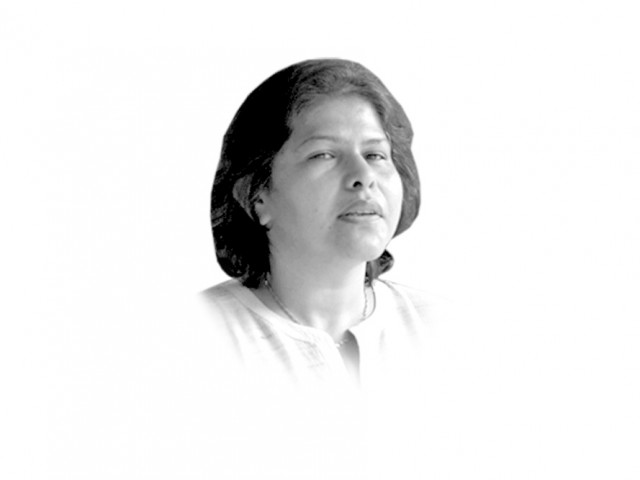Shock & Awe research
A professionally trained, disciplined force is necessary and it must not have some of the cowboys that we have today.

The writer is an independent social scientist and author of Military Inc.
But more important, the accompanied summary of the British Council survey fails to even pick on the nuances of its own research and mainly focuses on acceptance of sharia and military. For instance, while condemning democratic rule, 34 per cent of respondents considered the democratic system as comparatively better for providing access to water, gas electricity, education and heath care. However poor a democratic system, it is still the only one that caters for a larger redistribution of resources than military rule. As far as the seeming condemnation of democracy is concerned, this is not peculiar to Pakistan because Latin and South Americas have experienced similar situations where people seemed far more supportive of the military especially under democracy in transition, which is always beset with greater problems.
The report also failed to flag the significance of perception-building, especially through the extensive use of media, since 56 per cent admit to the influence of television channels and media (unlike the SDPI data, this one fails to consider people’s opinion about media itself). The electronic media, followed by print media, has played a major role in the past five years in building perception regarding various organs of the state. The political players get lambasted from morn until night adding to people’s anger and the media tends to exaggerate the shortcomings of the politicians vis-à-vis other players.
Similarly, the positive opinion reported in the British Council survey regarding the judiciary (51 per cent believe it has improved) is based on constructed perception rather than reality. The breaking news culture in this country is a “shock and awe” method of constructing opinion without analysing ground reality. Ordinary people hear about the suo-motu actions but fail to match these with actual and ultimate results in these cases. Ordinary folk are impressed by, for instance, action taken in Shahzeb Khan’s case in which the higher judiciary did not allow witnesses to retract. However, this is still no answer for improving the judicial system that makes it possible in hundreds of terrorist cases for criminals to escape conviction because no efforts were ever made for securing evidence. Are we even talking about a witness protection programme?
Meanwhile, the state seems to be collapsing at places, a term that people hate to use in this country. But what does one call a situation where police officers resort to extra-judicial killings and are then paraded around the place as heroes? Punjab, in particular, is known for this method, which, in itself, is travesty of justice. The state police is appointed and trained to apprehend criminals and bring them for fair trial. Police officers are discouraged by lack of capacity and corruption of the judicial system, and encouraged by political bosses, to resort to quick fix solutions like extra-judicial killings. This method, however, allows crime and criminals to expand and go deeper into society. Why would a criminal, for instance, surrender to the police or take an amnesty plan seriously if he fears being summarily murdered? An extra-judicial killing may look exciting in a film but it is technically plain murder. Moreover, with this method in place, where is the difference between the state police and the Taliban who also often kill people in the name of speedy justice. Why condemn the tribal areas when other parts of the country have also become tribalised?
Naturally, this method provides very short-term relief but it also makes society susceptible to violence — if random police officers can kill without trial, then why can’t individuals if they think they are delivering justice? The fact is that the overall policing system has collapsed to a great degree. Police officers tend to compete with one another in extra-judicial killings and then boast of having brought down crime in their areas by fudging and manipulating numbers. All it takes is for the police not to register an FIR for the crime figures to go down. Sadly, there is no mechanism for an objective and impartial assessment of the police that could go as feedback to the government. Extra-judicial violence also has the effect of scaring organised civil society that, in any case, comprises a lot of corrupt elements who then eulogise such action rather than condemning it. When you have posters and banners by civil society patting a police officer for such action, it is something to get worried about and not celebrate.
Pakistan definitely needs to restructure its internal security apparatus, especially the police. A professionally trained and disciplined force is necessary and it must not have some of the cowboys that we have today. However, a change in the policing system must go hand in hand with major restructuring of the judicial system. It is obviously attractive to play to the gallery but if the superior judiciary of this country wants to be remembered by posterity, it must take measures in streamlining and improving mechanisms for strengthening its capacity to provide justice. The present method of evidence collection and its interpretation by the court is vague. The exceptions made in the Shahzeb Khan or the Memogate cases need to be institutionalised.
The muck of the system is not just stuck with political society but is all over. Wonder who will volunteer to clean up?
Published in The Express Tribune, April 11th, 2013.
















COMMENTS
Comments are moderated and generally will be posted if they are on-topic and not abusive.
For more information, please see our Comments FAQ